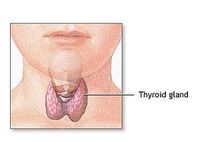HAIR LOSS, INCREASE IN WEIGHT AND EASY FATIGABILITY CAUSED BY THYROID PROBLEMS
Posted by Manny Y on 7th Apr 2015
When we experience weight gain, easy fatigability and hair loss, this is often diagnosed as a natural process of ageing, especially when the patient is around 30 years old and above. Though this is true and most patients experience all three symptoms, it is also important to do a thorough examination to rule out any thyroid problems.

The thyroid gland is located in the neck around the Adams apple, it the biggest endocrine gland in the body. The thyroid gland produces three types of hormones, Triiodothyronine or T3, thyroxine also known as T4, and calcitonin. Calcitonin is responsible for balancing calcium blood levels. While T3 and T4 function is to regulate the metabolism of the body. The balance of thyroid hormones especially T3 are T4 are important because too much or too less can cause certain conditions.
High levels of circulating thyroid hormones increase overall metabolic rate hence the term hyperthyroidism. Common signs and symptoms of hyperthyroidism are difficulty gaining weight even with frequent food intake, eyes problems called exophthalmos (bulging of the eyes), increased heart rate, tremors, and difficulty sleeping.
On the other hand, low thyroid levels cause hypothyroidism. Common symptoms are weight gain even with decreased food intake, easy fatigability, constipation, and in some patients, depression. Some patients may experience hair loss with hypothyroidism, since food and nutrients are not properly metabolized, vitamins and proteins needed for hair growth are decreased, thus the hair loss.
What should be done? Preventing thyroid problems is way better that treating it. Adequate intake of iodine rich foods like fish Haddock or any marine fish, kelp, seaweed, and cheese can significantly reduce the risk of developing thyroid problems. Salts that are infused with iodine and supplemental vitamins are also a good source.
Treating thyroid problems depend on which disease a patient has acquired. Hyperthyroidism and hypothyroidism are treated differently. Usually, medications are given aimed to control and regulate hormone production. A more aggressive treatment is surgically removing the thyroid gland. This is not done routinely unless otherwise indicated.

